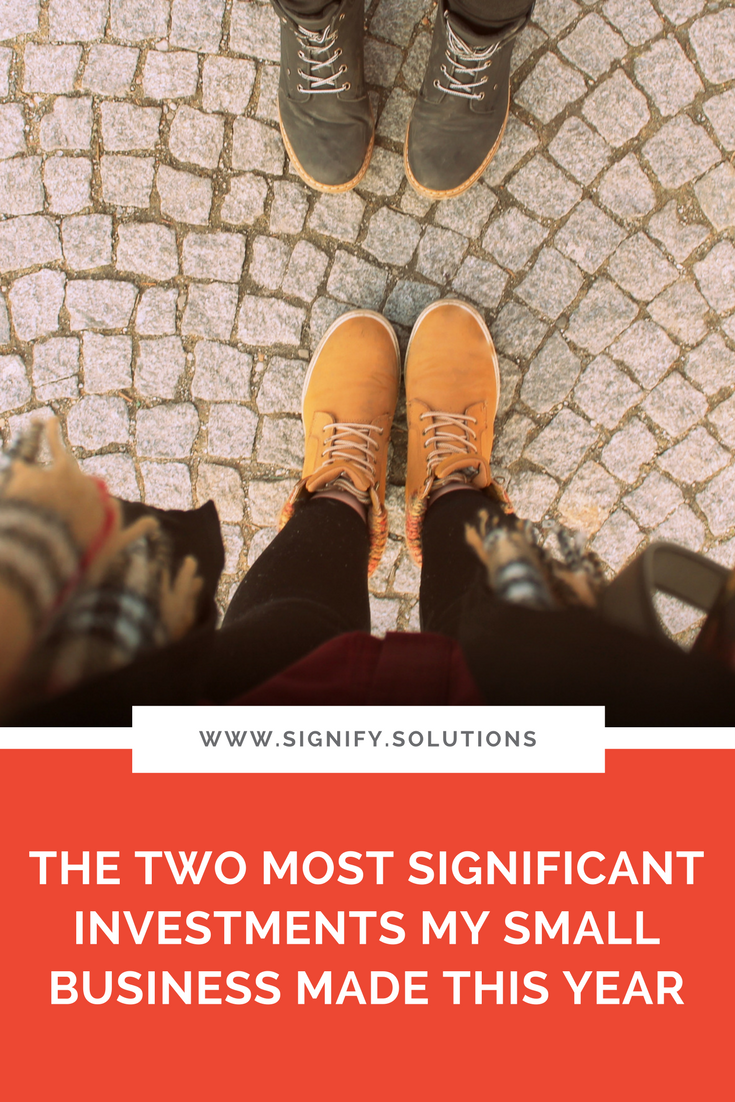Today's guest post comes from Daron Dickens, a licensed Marriage and Family Therapist, and one of my bestest friends for the past 15+ years. He's one of the smartest people I know, and I credit Daron with helping me stay sane and mentally healthy (depending on who you ask, I guess).
While this is often "the most wonderful time of the year," it can also be extremely difficult for a number of reasons. I think it's hard for pretty much everyone to invest in self-care, but as we are people who value purpose over profit, I think it's even harder. There's more on the line, and getting in additional sales and donations during the holidays is a lot of pressure, especially when you're trying to filter those funds into a cause. I want your nonprofit or social enterprise to flourish, but not at the sake of your health.
So, I wanted Daron to share some practical tips for managing self-care. I hope you find them helpful!
It Wasn't In My Plan
My sophomore year in college was the first time I experienced it. I had begun my college career two years prior with a solid plan. I took AP and college classes in high school, and because of that, I had been able to enter college as a sophomore.
I had a plan, I had a mission, and I was on target.
My schedule was perfectly designed to fit the maximum allowable number of class hours per semester in order to attack my double major. All of this while working a part-time job to put myself through school, and rock a rich social life. My schedule was delicately designed with activities back to back to back. I want to let you know—I was killing it! That’s when it happened...
Something unexpected.
What was that unexpected thing? Well, it’s actually incidental to the story. It’s not what happened, it’s the fact that it was unexpected. That’s all it took. I was kicking butt and taking names. Everything was working perfectly. It only took one unexpected thing, a bump in the road with no way to see it coming or prepare, to set the whole thing on fire. But more about the fire in a minute.
As I said, I was in my sophomore year in college and killing it when the unexpected happened. Way back, when people didn’t have their own personal computers, there was an ancient center where everyone would gather: The Computer Lab. This was a place I knew well, especially as I worked on a particular project for my Intro to Psychology class.
For this particular class our entire grade rested on one project that was due the last day of class. The assignment was to put together a book filled with our typed notes from the class, three book reviews in the field, our philosophy of a health family, and four essays from a list of topics. It was quite an undertaking, and took the whole semester to complete.
The only problem was some "Jimmy Jack" (my word for idiot) loaded a computer virus onto the computers in the lab which turned words into random symbols from the oldest document you’d opened to the newest. So most of my book was destroyed by the end of the semester before I discovered it. I had to do the whole thing over.
I was taking summer school (I told you I was killing it), upping the hours of my job for the summer, and living across the street with my roommate’s family. Now I had to fit in time to go to the computer lab to redo the massive project per my teacher’s extension.
Each day, I would go to class from 8:00 a.m. until noon, eat my lunch from 12:00 to 12:30 p.m., slave over the computer in the lab from 12:30 to 3:00 p.m., come home to change for work from 3:00 to 3:30 p.m., then go to my job from 4:00 until about 10:30 p.m. It was that schedule that finally did me in.
My Wake-Up Call
It happened when I came home to change for work after the computer lab. I “woke up” to find myself sitting on the bed with my face four inches from a blank wall—just staring at it. I looked at the clock and realized that I’d been like that for about half an hour. I was late for work. I couldn’t even remember sitting on the bed, but there I was, a walking zombie. My brain was done.
That was the first time my brain hijacked my body, but it certainly wasn’t the last time. This is the natural result of not investing in self-care. As my friend, Hal Runkel, wrote in his book, ScreamFree Parenting:
“If you do not take intentional retreats, you will take unintentional escapes.”
It’s just how your brain works. A retreat is something that you do intentionally. It’s a backing up and regrouping so that you can go and fight again another day. An escape is completely disengaging. The problem with an escape is everything that you escaped from is still waiting on you when you return. Rather than being recharged and ready to go fight again, you’re in the exact same spot that you started.
A Little About Retreats
Many of us, especially those who are self-employed or in cause-focused organizations, have trouble even thinking about taking a retreat, let alone identifying when they’re needed. Instead of retreating, we go on vacation, completely exhausted. If this vacation actually involved rest, we might be able to get back, but only to zero.
I’m here to help. I'll start with the most important foundational factor: how to determine you need a retreat.
It's not when you're exhausted.
It is not when you are stressed beyond the norm.
It is not even after a big project.
All of those depend on the environment and the situation you are in. To truly utilize self-care, it must not be dependent on your situation. Situations change wildly, your health should not.
It’s the major problem with finding time to care for ourselves . . . there is never time. There will always be more things to do than time to do them in. Unexpected things are not unexpected because they happen routinely.
Here's a simple framework for you to implement essential self-care so that you can take intentional retreats rather than finding yourself staring at a wall for half an hour in an unintentional escape.
Most of us do not have unlimited resources, whether that is time, energy, or other resources like money. So, it’s important to think in terms of a realistic lifestyle. You don’t have to think about a three-month unpaid sabbatical or that perfect vacation on the beach. Everything you do for self-care doesn’t have to be the same. Obviously, different activities provide different amounts of rest and recuperation. The only practical way to work in your normal schedule is by spreading out elements of self-care strategically. We call this “Weekly, Monthly, Quarterly.”
WEEKLY
This is something that you do each week that is low-key and low maintenance, but life-giving. It’s not limited to only once a week, but it needs to happen at least once a week. This can be as simple as working out, getting a massage, or just lounging on the couch watching football or your favorite HGTV show. This is the time you’re going to give yourself permission to rest and to renew on a small scale each week. Whatever that looks like to you.
MONTHLY
This is something that might be a little more involved. This might be something that you would need to hire a babysitter for if you have kids or schedule further in advance. It’s something that might take a whole day or many hours. This might be the date night with your spouse. This might be going to an event that brings life to you like a concert or a movie opening or a church event. This is more high-maintenance than weekly, but not a break-the-bank kind of activity. This is something that you could do very easily within your budget but only in a monthly timeframe.
QUARTLY
This is where you’re going to go all out. This doesn’t have to be extravagant or expensive, but it is going to be a lot more involved than something you can do on a weekly basis. This might be a retreat, conference, a staycation where you go somewhere void of electronics, or just simply a weekend without the kids where you give yourself permission to completely veg out the whole weekend.
Final Self-Care Tips
There is one pothole here that you want to avoid. The name of the game on your quarterly event is to RENEW. Often people use this time to do something exciting or fun that they have always wanted to do. This is how we often do a vacation. If you're anything like me, I often need a vacation to recoup from the vacation! So, be careful that your objective is relaxation and recuperation. That is the win.
This is something that you’re probably going to have to plan well in advance and, like I said, you’re only able to do once-in-a-while. Most likely you won’t do the same thing each quarter. The different quarters just give you four, different types of things that you can do once a year. This will give you plenty of time to plan and to budget both your time and money.
Now the hard part: actually planning things out. I find that many people think this is a great idea, but they spend all of their time thinking about what they want to do quarterly. My advice is to get out your calendar and reserve the time for these breaks right now. It will force you to plan things out rather than keep waiting until the time magically appears, or you think of the perfect activity.
The time will not magically appear. This is something that you have to value just as much as your work, your family, or your personal health. If you do, self-care can be the thing that is not an ER to your crisis, but the apple a day that will keep the doctor away in the first place.
PS: If you haven't read them yet, Daron also recommends Crazy Busy by Kevin DeYoung and Boundaries: When to Say Yes, How to Say No to Take Control of Your Life by Henry Cloud and John Townsend. I totally second both of these!
Daron Dickens is a Marriage and Family Therapist who has practiced for 18 years. He also previously served as a pastor for 20 years. He lives in Clarksville, Tennessee, with his wife, Margaret, and his sons, Truman and Carter. He loves pie, reading, coffee, and everything baseball.
You can find him on:
PIN THIS POST FOR LATER:
I'm Kristi Porter, and I started Signify to provide writing, consulting and strategy services to nonprofits and for-profit organizations with a social mission, primarily through copywriting, marketing, and business communications. I believe that cause-focused organizations like yours are the future of business. You're proof that companies can both make money and do good. And I'm here to help you get noticed and grow. When you succeed, we all win.


















































